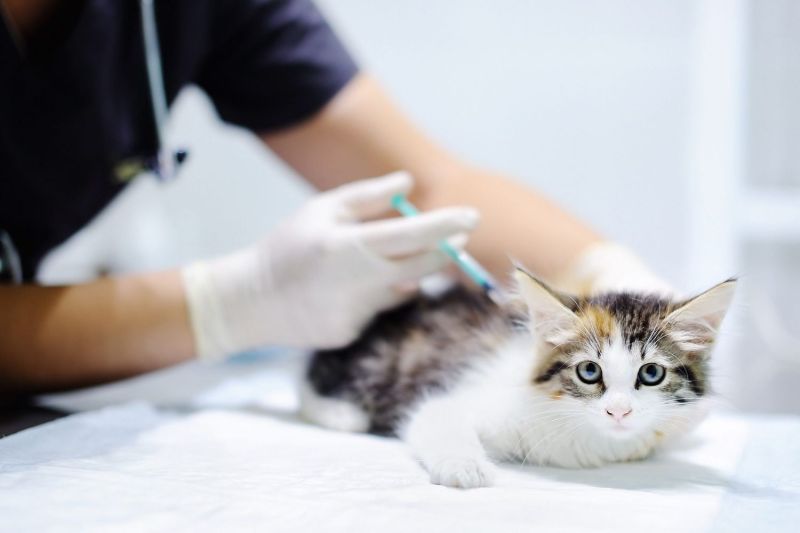Where Can I Get My Kitten Vaccinated For Free – When it comes to treatment, there is no one-size-fits-all approach. And recommendations for preventing cats are also rare.
Making sure your cat has the vaccinations it needs and is up to date with shots is an important part of being a pet parent.
Where Can I Get My Kitten Vaccinated For Free

The Feline Advisory Council regularly reviews and investigates advances in cat vaccination to make science-based recommendations. This panel is made up of veterinarians and feline experts and is considered the most trusted source for cat vaccination ratings.
Vaccination Cat Hi-res Stock Photography And Images
Their guidelines, published by the American Association of Feline Practitioners, are among the most trusted and widely used in the field.
Primary vaccinations are recommended for all cats, regardless of location or condition. Vaccines that are suitable for certain cats are sometimes considered secondary vaccines (or lifetime vaccines).
Vaccination is the first and best way to protect them from many diseases such as feline leukemia (FeLV), rabies and panleukopenia, to name a few.
These diseases are highly contagious and occur all over the world. It is especially dangerous for young cats and vaccinations are considered to be the best protection against a small risk.
Holmes Park Vaccine Clinic — Fresno Humane Animal Services
FeLV vaccine is recommended as a primary vaccination for all calves. Once the cat is older, the FeLV vaccine is considered inappropriate as long as there is little risk to the cat.
The rabies vaccine is given annually or every three years, depending on state laws and the brand of vaccine being used. Rabies is important not only because of its effects on cats, but also because it is a zoonotic disease, that is, it can be transmitted to humans. It can also kill.
Although cats are natural carriers of rabies, they can be infected by the bite of any infected mammal and then infect others.

The rabies vaccine is a primary vaccination (per AAFP guidelines) and is required by law in most jurisdictions.
Dutchess County Health Reminds Residents That Warm Weather Increases Rabies Exposure Risk
The other three main vaccines are combined into a single vaccine called the FVRCP vaccine. This allows veterinarians to effectively administer the vaccine at one time, instead of three injections in one visit:
If your cat is an adult indoor cat, FVRCP can be performed every three years. If you’re an outsider, young or old, your veterinarian can give you the FVRCP injection every year.
Cats exposed to stressful situations, such as shelters, may benefit from a booster vaccination for seven to 10 days.
Feline panleukopenia, also known as feline parvovirus, is a highly contagious and fatal disease in cats.
Cattfeinated Cat Cafe
While the illness usually begins with low energy and loss of appetite, it continues with vomiting and diarrhea. The virus also kills white blood cells, making young cats more susceptible to other infections.
Some of the symptoms you can expect include wheezing, stuffy and runny nose, and conjunctivitis. Sometimes, it also causes mouth ulcers and pneumonia.
Once the cat has recovered from the initial infection, the virus enters the bloodstream during a latency period. In stressful situations, the virus can reactivate and the cat can start to show signs of infection, even if it has not been exposed to the disease again.
Feline calicivirus is a group of viruses that cause symptoms of upper respiratory tract infections, such as sneezing and runny nose, as well as mouth sores.
Free Cat And Dog Vaccine Clinic
FCV is suspected to be associated with chronic gingivitis/stomatitis, a painful inflammation of the gums and teeth. Some of the more severe causes hair loss and scarring in other parts of the body, as well as hepatitis and death.
FeLV is found worldwide; Transmitted through bodily fluids, including saliva, urine, and feces, FeLV is transmitted when an infected cat comes into close contact with another cat that cares or shares bowls.
FeLV infection is not a death sentence. Most cats are lucky enough to get into the recovery phase and look good throughout their lives, but some don’t.
After a latent period lasting months or years, the disease continues to develop in various associated conditions, such as lymphoma, anemia or immunosuppression, leading to secondary disease.
Our Free Vaccine Clinic…
FeLV vaccine is recommended as the primary vaccination for calves. The first vaccination series consists of two doses three to four weeks apart, followed by one year later for all adult cats.
However, based on the latest information, the Vaccine Advisory Group recommends that subsequent vaccinations be given based on risk: annually for high-risk cats and every two years for low-risk cats.
These vaccines, which are rarely given, can be kept in multi-cat homes, kennels, or shelters to reduce or prevent infection and spread of respiratory diseases.

Additionally, the infective peritonitis (FIP) vaccine is generally not recommended because it does not show sufficient levels of protection to be effective.
Athens Area Humane Society
Many factors contribute to a cat’s susceptibility to infectious diseases. Things your veterinarian will consider when deciding on a vaccination schedule for your cat include:
Individual costs can vary, but pet parents should expect to pay between $15 and $40 for a cat vaccination.
Some vaccines are more expensive than others. Talk to your veterinarian, as many clinics have health plans that cover the cost of preventive care, such as vaccinations, and office visits.
Unfortunately, vaccines are not without side effects, and when the benefits of treatment outweigh the risks, side effects can occur. It is estimated that the reaction occurs in 0.52% of cats or 52 out of 10,000.
Cat Vaccination Royalty Free Vector Image
Side effects from any vaccine can range from common but mild symptoms, such as pain at the injection site, to extreme, life-threatening and even death.
Yes! There are many life-threatening diseases and infections that cats can be susceptible to. Vaccinations are an important part of keeping your cat healthy.
Kittens need more vaccinations in the first months of life, starting at 6 weeks of age.

Vaccines that require a “boost”, meaning that a sufficient level of immunity is achieved, are often given every three or four weeks.
Outdoor Cats Faq
Vaccines contain modified (weakened or killed) parts of viruses or bacteria that stimulate the cat’s immune system to produce antibodies that can help fight future infections if they are infected.
Dr. Katie Grzyb received her Doctor of Veterinary Medicine degree from Ross University in 2009. She continued her clinical training in…


